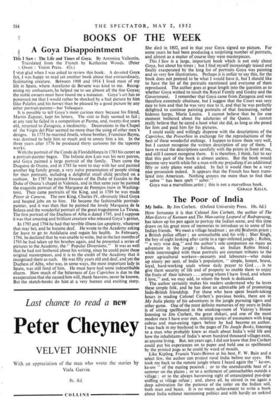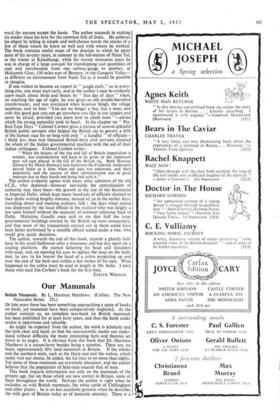The Poor of India
My India. By Jim Corbett. (Oxford University Press. 10s. 6d.) How fortunate it is that Colonel Jim Corbett, the author of The Man-Eaters of Kumaon and The Man-eating Leopard of Rudraprayag, has taken up his pen again to portray the Indian scene, and this time draws on his great store of memories to introduce us to some of his Indian friends. We meet a village headman • an old Brahmin priest ; a British police officer ; an untouchable and his wife ; Sher Singh, the boy of eight looking after cattle in a tiger-infested jungle ; Robin, "a very wise dog," and the author's sole companion on many an adventure in the jungle ; Sultana, an Indian Robin Hood ; while intermingled with these portraits are constant tributes to the poor agricultural workers—peasants and labourers—who make up ninety per cent. of India's population, "simple, honest, brave, loyal, hard-working souls whose daily prayer to God. . . is to give them security of life and of property to enable them to enjoy the fruits of their labours . . . among whom I have lived, and whom I love," and, we may add, to whom the book is dedicated.
The author certainly makes his readers understand why he loves these simple folk, and he has done an admirable job of promoting Indo-British friendship. For those who have spent breath-taking hours in reading Colonel Corbett's previous books, there are in My India plenty of his adventures in the jungle pursuing tigers and other game. One of the most definite memories of my years in India is of sitting spellbound in the smoking-room of Viceroy's House listening to Jim Corbett, the great shikari, and one of the most modest men I have ever met, relating stories of encounters with king cobras and man-eating tigers before he had become an author. I was back in my boyhood in the pages of The Jungle Books, listening to a man who probably knew as much about India's wild life and how the inhabitants of India's seven- hundred thousand villages exist, as anyone living. But, ten years ago, I did not know that Jim Corbett could put his experiences on to paper and hold one as spellbound by the printed page as he could by word of mouth. Like Kipling, Francis Yeats-Brown at his best, F. W. Bain and a select few, the author can project rural India before our eyes. He took me back to the remote jungle where I heard again the" ke-ow, ke-ow " of the mating peacock ; or to the unendurable heat of a summer on the plains ; or to a settlement of untouchables outside a village ; or to the always harrowing sight of emancipated pye-dogs sniffing at village refuse ; and, above all, he stirred in me again a deep admiration for the patience of the toiler on the Indian soil, both man and beast. It is no mean achievement to write a book about India without mentioning politics and with hardly an unkind word for anyone except the bania. The author succeeds in making his reader share his love for the common folk of India. He achieves his object by telling in simple and well-chosen words the stories of a few of those whom he knew so well and with whom he worked. The book contains useful maps of the districts in which he spent most of his seventy years, in summer in the hill-station of Naini Tal, in the winter at Kaladhungi, while for twenty strenuous years he was in charge of a large entrepot for transhipping vast quantities of coal and merchandise from one railway-gauge to another, at Mokameh Ghat, 150 miles east of,Benares, in the Gangetic Valley— as different an environment from Naini Tal as it would be possible to imagine.
If one wishes to become an expert in "jungle craft," as in every- thing else, one must start early, and in the author's case he evidently knew much about birds and beasts by" that day of days " when, on reaching the age of eight, he was given an old double-barrelled muzzle-loader, and was overjoyed when Kunwar Singh, the village headman, said to him: "You. are no longer a boy, but a man; and with this good gun you can go anywhere you like in our jungles and never be afraid, provided you learn how to climb trees "—advice which the young naturalist took to heart. In his chapter on" Pre- Red-Tape Days "Colonel Corbett gives a picture of several splendid British public servants who helped the British raj to govern a fifth of the human race for so long with only" a handful "of officials— I think less than two thousand British-born civil servants directed the whole of the Indian governmental machine with the aid of their Indian colleagues. Colonel Corbett writes : "When the history of the rise and fall of British- imperialism is
written, due consideration will have to be given to the important part red tape played in the fall of the British raj. Both Ramsay (General Sir Henry Ramsay) and Anderson (Sir Frederick Anderson) served India at a time when red tape was unknown, and their popularity and the success of their administration was in great measure due to their hands not being tied with it."
The author evidently agrees with many other admirers of the old I.C.S., who deplored—however inevitable the centralisation of authority may have been—the growth in the size of the Secretariat in Imperial Delhi, which kept many hundreds of officials chained to their desks writing lengthy minutes, instead of, as in the earlier days, travelling about and meeting ordinary folk ; the days when justice was dispensed by the local official in the mofussil who was largely a law unto himself without the necessity of constant reference back to Delhi. Mahatma Gandhi once said to me that half the large governmental buildings erected by the British raj were unnecessary, and that most of the transactions carried out in them could have been better performed by a sensible official seated under a tree, who could give quick decisions.
The author, towards the end of this book, records a ghastly half- hour in his small bathroom after a strenuous and hot day spent on a coaling platform. He started lathering his head and shoulders with soap, and, on opening his eyes to replace the soap on the bath- mat, he saw to his horror the head of a cobra projecting up and over the end of the bath and within a few inches of his toes. What happened to the cobra must be read at length in My India. I envy those who read Jim Corbett 's book for the first time.
EVELYN WRENCH.



































 Previous page
Previous page